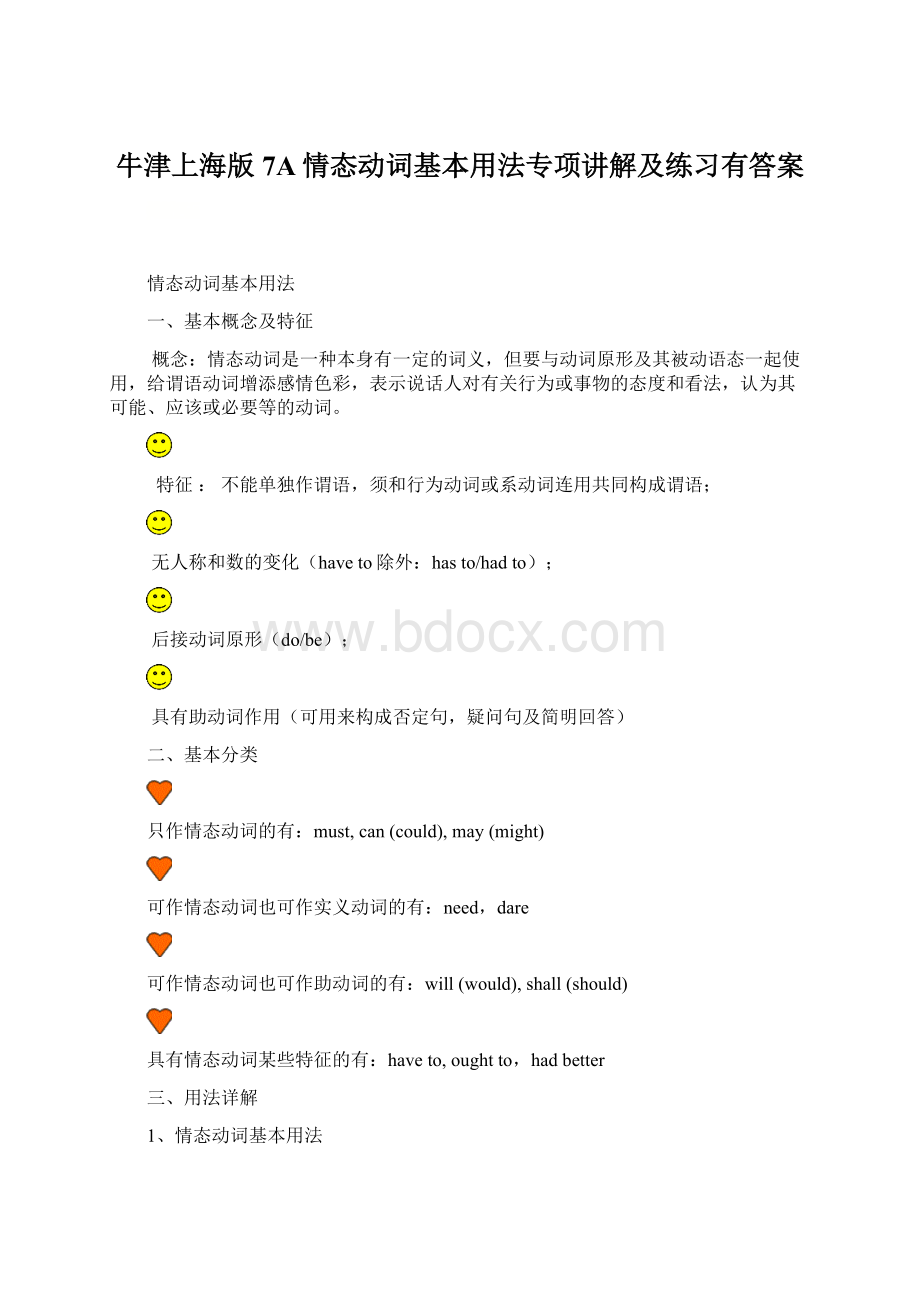牛津上海版7A情态动词基本用法专项讲解及练习有答案Word文档格式.docx
《牛津上海版7A情态动词基本用法专项讲解及练习有答案Word文档格式.docx》由会员分享,可在线阅读,更多相关《牛津上海版7A情态动词基本用法专项讲解及练习有答案Word文档格式.docx(9页珍藏版)》请在冰豆网上搜索。

will(would),shall(should)
具有情态动词某些特征的有:
haveto,oughtto,hadbetter
三、用法详解
1、情态动词基本用法
1)can/could
表示能力,意为“能、会”。
Twoeyescanseemorethanone.
Couldthegirlreadshewenttoschool?
⑵表示请求或允许,多用于口语中,意为“可以”,相当于may。
Youcangonow.
CanIhavealookatyournewpen?
Heaskedwhetherhecouldtakethebookoutofthereading-room.
⑶较委婉客气地提出问题或陈述看法。
Can(Could)youlendmeahand?
注意:
情态动词的过去式除了表示过去的时间这一用法外,更多时候表达一种比原形更为委婉客气的语气。
尤其在出现在宾语从句主句中时,并不影响从句的时态。
练习:
用can或could填空.
1)I'
mreallyhungry.Ieatahorse!
2)It'
ssonicehere.IstayherealldaybutIhavetogo.
3)"
Ican'
tfindmybag.Haveyouseenit?
"
"
No,butit_____________beinthecar."
4)Peterisamusician.Heplaystheviolinandhe____________alsoplaythepiano.
5)Theweatherisnicenowbutit_____________changelater.
keys:
1)could2)could3)could4)can5)could
2)may/might
⑴表允许,might可以指过去时间,也可指现在时间,语气更委婉。
Youmaytakewhateveryoulike.
HetoldmethatImightsmokeintheroom.
May(Might)Iaskforphotoyourbaby?
⑵表示祝愿,常用于倒装结构中:
Mayyousucceed!
祝你成功!
Mayallyourdreamscometrue!
愿你梦想成真!
选择最佳答案填空:
1)—IborrowyourMP3?
—Sure.Hereyouare.
A.MayB.ShouldC.MustD.Would
2)YougoandaskMeimei.Sheknowtheanswer.
A.must;
canB.must;
mayC.need;
canD.can;
may
3)I'
mnotsureifI'
llbefreethen.Iworkingthatweekend.
A.mustbeB.shouldbeC.maybeD.canbe
4)—IvisitLucyonSunday,Mum?
—Yes,you.
A.Must;
canB.May;
mayC.Need;
needD.May;
need
5)Petercomewithustonight,butheisn'
tverysureyet.
A.mustB.mayC.canD.Will
【Keys】4.1)A2)D3)C4)B5)B
3)must
⑴表示“必须”、“应当”。
Wemustloveourcountry.我们要热爱祖国。
Imusttakeadayofftomorrow.我明天必须请一天假。
⑵must的否定式(mustn’t)表示“不应该”、“不许可”、“不准”、“禁止”等,语气比较强烈。
Youmustn’tspeakloudlyinthelibrary.不许在图书馆大声喧哗。
Wemustn’twasteourtime.我们不应该浪费时间。
4)need
⑴作情态动词时,接动词原形。
仅用于否定句和疑问句,否定直接加not(needn’t)
—Needweleavesoon?
—Yes,youmust.(No,youneedn'
t)
Youneedn'
thavehurried.
(2)作实义动词时,接带to的不定式。
否定和疑问借助助动词完成(如didyouneed?
didn'
tneed)
Heneedstoseeadoctor.
Theydidn'
tneedtostartsoearly.(donotneedtodo)
选择填空。
1.Studentswearuniformsatschool.
A.mustB.canC.mayD.need
2.Wetalkorspeakloudlyinpublicplaceslikehospitals,librariesorcinemas.
A,needn’tB.mustn’tC.maynotD.don’t.
3.youtellmehowtoimprovemymemory?
A.DoB.CanC.MustD.Should
4.Ineitherreadnorwriteatthattime.
A.canB.mayC.mustD.could
5.TheconductorsaidIgetoffatthenextstop.
A.mustB.hadtoC.havetoD.wouldhaveto
6.Youtalksoloud.
A.don’thaveB.needn’tC.don’tneedD.notneed
7.Childrencrossbusystreetstogotoschool.
A.haven’ttoB.don’thaveC.don’thavetoD.nothaveto
8.—Canchildrenundertheageoftenridebicyclesinthecity?
——No.Accordingtothelaw,they.
A.maynotB.needn’tC.mustn’tD.shouldn’t
9.MustIwatertheflowerstoday?
—.It’sgoingtorain.
A.No,youneedn’tB.No,youcan’t
C.No,youmaynot.D.Yes,youmust
10.—Iparkmycarhere?
—Sorry,l’mafraidyou.Canyouseethesign“NoParking”here?
A.Can...canB.Need...maynot
C,May...can’tD.May...needn’t
1-5ABBDD6-10BCCAC
5)shall
表征询意见,用于第一、第三人称疑问句。
ShallIgetsometea?
Shalltheboywaitoutside?
Whatshallwedothisevening?
6)will
⑴表意愿,用于各种人称陈述句。
Iwilldoanythingforyou.
Noneissoblindasthosewhowon’tsee.
⑵表请求,用于疑问句。
Willyouclosethewindow?
It’sabitcold.
Won’tyoudrinksomemorecoffee?
(2)表示某种倾向或习惯性动作。
Fishwilldieoutofwater.
Thedoorwon’topen.
7)would
⑴表意愿。
IsaidIwoulddoanythingforyou.
⑵表委婉地提出请求、建议或看法。
Wouldyoulikeanotherglassofbeer?
Wouldyoumindcleaningthewindow?
Theywouldn’thaveanythingagainstit.
⑶表过去反复发生的动作或过去的一种倾向。
Everytimeshewasintrouble,shewouldgotohimforhelp.
8)should
⑴表义务。
意为“应该”(某件事宜于做),用于各种人称。
Youshouldbepolitetoyourteachers.
Youshouldn’twasteanytime.
9)oughtto
⑴表义务,意为“应该”(因责任、义务等该做),口气比should稍重。
Youarehisfather.Yououghttotakecareofhim.
Yououghtn’ttosmokesomuch.
⑵表推测,暗含很大的可能,语气较弱。
HanMeioughttoknowhistelephonenumber.
There’safinesunset;
itoughttobeafinedaytomorrow.
1.Heeatsogreedily.
A.shouldn’ttoB.oughttonotC.oughtnotD.oughtn'
tto
2.Let’splaytabletennis,?
A.willweB.shallweC.shan’tweD.willyou.